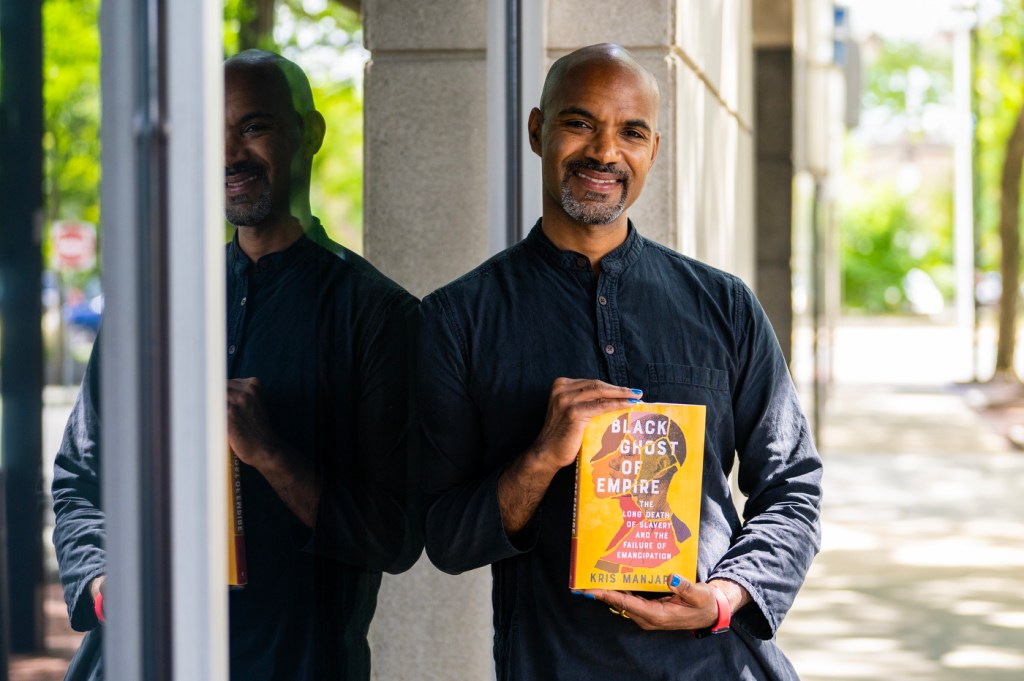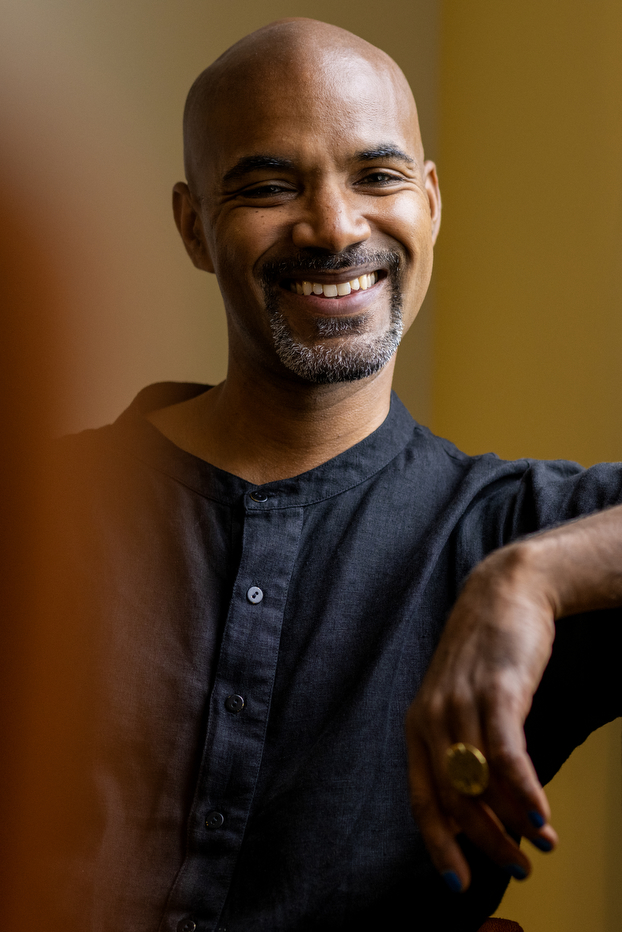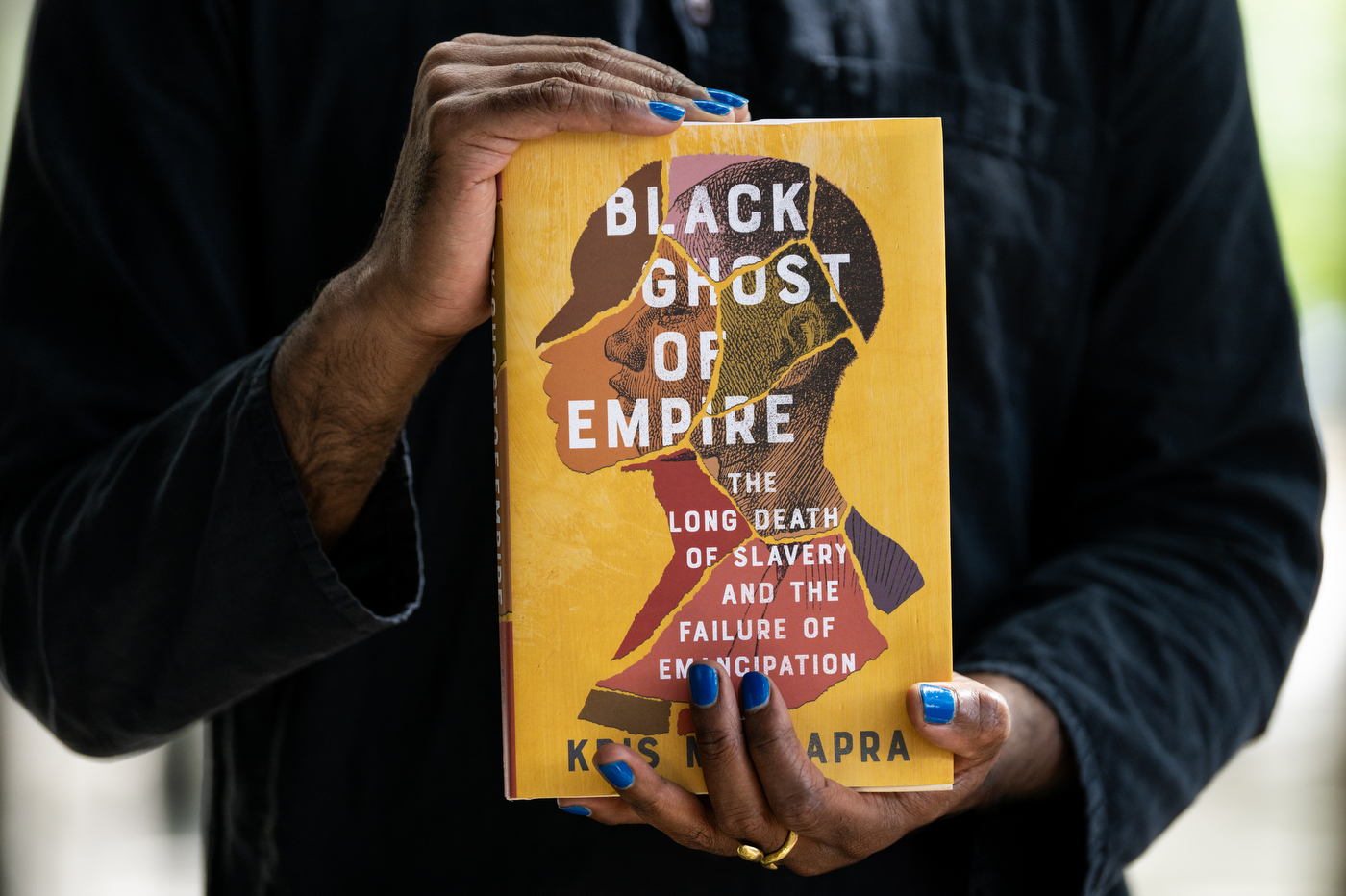Book challenges and shatters the universally recognized narrative about the end of slavery

Kris Manjapra was born in the Bahamas of mixed African and Indian parentage.
“I think that has always made me curious about origin stories,” says Manjapra, the Stearns Trustee professor of history and global studies at Northeastern University.
When he tried to investigate the gaps and traces of slavery in the history of his own family, however, he found a “historical void.”

“As somebody who has ancestors who came out of slavery, it makes my lineage much more of a challenge to uncover and to explore,” he says.
Manjapra has written four books exploring questions of colonialism and diaspora, the movements that colonial force had created as well as anti-colonialism, resistance to colonial forces and the forms of creativity that the colonized practiced.
In his fifth book, “Black Ghost of Empire: the Long Death of Slavery and the Failure of Emancipation,” Manjapra exposes the deceptive nature of emancipations of enslaved people, showing how 19th-century empires conspired to preserve the status quo of racial oppression and continue benefiting from it.
For its significant contribution to the understanding of “the false dawn of emancipation,” “Black Ghost of Empire” was placed on a shortlist for the British Academy Book Prize for Global Cultural Understanding. The winner of the award, which includes a $30,500 prize, will be announced Oct. 31.
“This book gives life and memory to the enslaved, identifies the forces that built new systems of servitude in the aftermath of slavery, and argues forcefully against the disavowal of these ghosts in our social order,” said the judges of the book prize, which celebrates significant ground-breaking research-based works of nonfiction that contribute to understanding of world cultures and the ways in which they interconnect.
NGN spoke to Manjapra about his book and what it means for the movement for racial slavery reparations.
The conversation has been edited for brevity and clarity.
Why was it important for you to write this book?
The ways that we have understood abolition and emancipation have tended to, number one, be very nation or state focused — the story in the United States or the story in the British Empire, or the story in the French Empire — but not connected and comparative across these different states.
Number two, the story of how slavery ended tends to foreclose or shorten the actual process of emancipation, so that emancipation is understood as a kind of almost instantaneous event, leading to this experience of freedom.
But if we slow our analysis down, and we look closely at the footage, so to speak, then what we see is a process that is a lot more complicated and actually repetitive in different parts of the world. There are underlying similarities in how emancipations happened globally, which relate to the reasons why racial oppression continues.
Also, the contemporary conversations that we’re having today about reparations for slavery need to be framed with some understanding of how emancipation has failed for these conversations to really make sense.
In the book, you use metaphors, such as “emancipation of unfreedom” and “defective freedom.” Why did emancipation fail the enslaved people?
I would say that emancipation failed because it did not lead to liberation for people who had been enslaved. Rather, emancipation led to added privilege to oppressors who had done the enslaving. Emancipations were engineered to do just that.
I would also say that liberation is a word that indicates the ability for people who have been oppressed to recognize their new condition as well, one that is unbounded that is. Meanwhile, freedom is often defined on the terms of the oppressors.
In the Northeastern seaboard, the first emancipation that began in the 1780s led not to liberation, but rather the creation of what was called indentureship or apprenticeship. Black people who are supposedly freed had to still serve for decades as unpaid laborers. There are other innovations that are engineered after that that, in some ways, add even new ways to pay compensation to enslavers, for example, direct cash payouts. This was practiced both in the French Empire and in the British Empire, but then also in many other European empires in the coming 100 years.
Then there was also the practice of giving land compensation to enslavers. This kind of compensation marked what happened in the United States, because the confiscated lands of enslavers were actually returned to them. That also was carried out in Cuba and in Puerto Rico, in Brazil, in the Spanish and the Portuguese empires.
But history shows us that when the same imperial states and empires went into, for example, Sub Saharan Africa or India, and they abolished slavery, they did so without following it with any kind of compensation. The states simply said that “We are ending an abomination, we’re attending to an injustice, so we can’t reward the oppressor.”
Describing the process of emancipation in the United States you especially hone in on the American North rather than South, why?
To me, it was important to highlight the narrative of Northern absolution, the way that the U.S. North has absolved itself of slavery with the narrative that slavery ended here first or that there was no compensation paid to slave owners, or that in the North is where the centers for abolitionism grew.

What my book shows is that there’s much more of a connected and comparative story here; that the North, in fact, is the place where compensated amounts of emancipation were first innovated. Although money was not given to slave owners directly, in-kind benefits, especially of the guarantee of free labor, were guaranteed and given to slave owners.
You also examine the question of significant participants of anti-slavery movement who are traditionally recognized as prominent abolitionists. What are the blanks in those narratives?
The point I was making about white abolitionists is not to say that they did not play an important role in history or that they did not contribute to the end of an abominable institution. But it is rather to say that there’s more gray space in the story than we are used to recognizing and that there are ways that one could be an abolitionist and still be a proponent of forms of racial oppression. Those could go together.
However, there are wonderful cases of people who are not well known, for example, Elizabeth Heyrick, who were extremely vocal about the need for emancipation to actually lead to liberation for the enslaved.
We also have among the abolitionists people like Robert Wedderburn, who was a Jamaican living in London. We have the people who were leading the 1823 rebellion in today’s Guyana or the 1831 rebellion in today’s Jamaica. We don’t tend to think of Black people as abolitionists, but they were abolitionists. It was their actions that directly led to what then happened in terms of the actual end of the institution of slavery.
How do you see the role of historians in the ongoing struggle for reparations?
I think that the historian or the humanities scholar has a direct role to play in contemporary social movements and contemporary social struggle. That role is precisely to do what I might call the intellectual work, which is a form of labor, in order to uncover documents, in order to make connections, in order to create a framework for discussion.
All of this kind of work goes into politics, and politics being the ability to talk about things, the ability to make certain kinds of claims apparent.
If we see ourselves or identify as having a responsibility to those who are oppressed, that leads to the natural question that we should use our skills, our ability, our mode of work in order to contribute to those practices of anti-oppression.
So in that sense, I’m a very explicitly and vocally politically engaged, activism engaged historian. And I think that’s a way of doing history which is important and which I stand by.
Alena Kuzub is a Northeastern Global News reporter. Email her at a.kuzub@northeastern.edu. Follow her on Twitter @AlenaKuzub.






